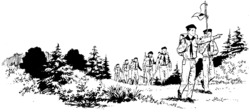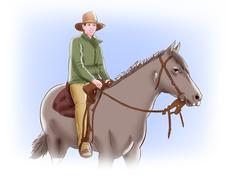 Suppose that instead of a usual weekend campout, the Scouts of your troop have decided to go on a weekend hike – maybe to get a taste of what a longer voyage like a Philmont trek might be like.
Suppose that instead of a usual weekend campout, the Scouts of your troop have decided to go on a weekend hike – maybe to get a taste of what a longer voyage like a Philmont trek might be like.
They’ll start out by getting dropped off Friday night, hike to their first campsite, set up and camp overnight. Then in the morning they’ll have breakfast, pull up stakes and hit the trail. Lunch is enroute, then arrival at a second site Saturday evening, where they’ll set up again, cook dinner, have a campfire and turn in. After Sunday morning’s breakfast, they’ll break camp and hike to where the parents are waiting to pick them up.
This requires not only a good amount of planning but some training, so the Scouts will know what to expect and what to plan for. Continue reading “Adults teaching Scout skills”


 Every school day, our Scouts get up in the morning, have their breakfast, gather their belongings and head off to school for a day of learning. Important subjects such as history, English, mathematics, science, music and art are taught, with the aim that our young people will acquire a well-rounded set of skills to give them a starting point when they head out to college and a career.
Every school day, our Scouts get up in the morning, have their breakfast, gather their belongings and head off to school for a day of learning. Important subjects such as history, English, mathematics, science, music and art are taught, with the aim that our young people will acquire a well-rounded set of skills to give them a starting point when they head out to college and a career.

 The game of Scouting that we play is indeed a game. We hope that our boys are having fun, and one of the best ways to have fun is to play a game. William “Green Bar Bill” Hillcourt was the first to describe Scouting asÂ
The game of Scouting that we play is indeed a game. We hope that our boys are having fun, and one of the best ways to have fun is to play a game. William “Green Bar Bill” Hillcourt was the first to describe Scouting asÂ